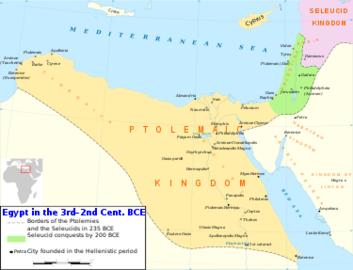Ptolemaic dynasty
Royal House | Royal
The Ptolemaic dynasty, sometimes referred to as the Lagid dynasty, was a Macedonian Greek royal dynasty which ruled the Ptolemaic Kingdom in Ancient Egypt during the Hellenistic period. Their rule lasted for 275 years, from 305 to 30 BC. The Ptolemaic was the last dynasty of ancient Egypt. Ptolemy, one of the seven somatophylakes (bodyguard companions), a general and possible half-brother of Alexander the Great was appointed satrap of Egypt after Alexander's death in 323 BC. In 305 BC, he declared himself Pharaoh Ptolemy I, later known as Sōter "Saviour". The Egyptians soon accepted the Ptolemies as the successors to the pharaohs of independent Egypt. Ptolemy's family ruled Egypt until the Roman conquest of 30 BC.
Like the earlier dynasties of ancient Egypt, the Ptolemaic dynasty practiced inbreeding including sibling marriage, but this did not start in earnest until nearly a century into the dynasty's history. All the male rulers of the dynasty took the name Ptolemy, while queens regnant were all called Cleopatra, Arsinoe or Berenice. The most famous member of the line was the last queen, Cleopatra VII, known for her role in the Roman political battles between Julius Caesar and Pompey, and later between Octavian and Mark Antony. Her apparent suicide at the conquest by Rome marked the end of Ptolemaic rule in Egypt.
Subject ID: 133036
MoreThe Ptolemaic dynasty, sometimes referred to as the Lagid dynasty, was a Macedonian Greek royal dynasty which ruled the Ptolemaic Kingdom in Ancient Egypt during the Hellenistic period. Their rule lasted for 275 years, from 305 to 30 BC. The Ptolemaic was the last dynasty of ancient Egypt. Ptolemy, one of the seven somatophylakes (bodyguard companions), a general and possible half-brother of Alexander the Great was appointed satrap of Egypt after Alexander's death in 323 BC. In 305 BC, he declared himself Pharaoh Ptolemy I, later known as Sōter "Saviour". The Egyptians soon accepted the Ptolemies as the successors to the pharaohs of independent Egypt. Ptolemy's family ruled Egypt until the Roman conquest of 30 BC.
Like the earlier dynasties of ancient Egypt, the Ptolemaic dynasty practiced inbreeding including sibling marriage, but this did not start in earnest until nearly a century into the dynasty's history. All the male rulers of the dynasty took the name Ptolemy, while queens regnant were all called Cleopatra, Arsinoe or Berenice. The most famous member of the line was the last queen, Cleopatra VII, known for her role in the Roman political battles between Julius Caesar and Pompey, and later between Octavian and Mark Antony. Her apparent suicide at the conquest by Rome marked the end of Ptolemaic rule in Egypt.
Subject ID: 133036
Subject ID: 133036

